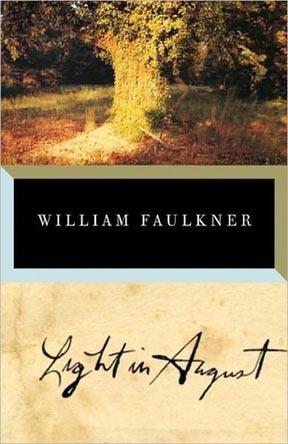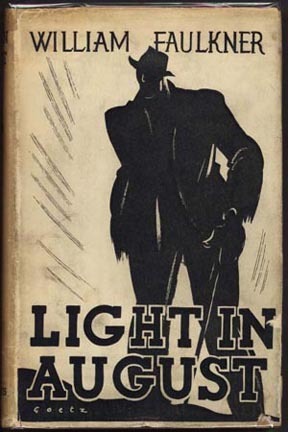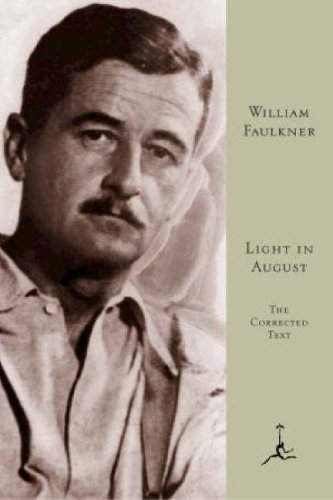Light in August
William Faulkner’s prose—stamped with his poetic lineage—shines.
I’m a failed poet. Maybe every novelist wants to write poetry first, finds he can’t and then tries the short story which is the most demanding form after poetry. And failing at that, only then does he take up novel writing. —William Faulkner to The Paris Review
William Faulkner began as a poet, and it shows. He adores words. His sentences shine as well in Light in August, sometimes referred to as his greatest novel. Sometimes it’s also called his most accessible great one, the last bead on his string of masterpieces between 1929 and 1932: Sartoris, The Sound and the Fury, As I Lay Dying, Sanctuary. I remember Light in August fondly from college. I wrote mostly poetry then, and realized only recently that I had based a character, in an epic poem I was slaving over at night, after the novel’s immortal Lena Grove.
Rereading it this summer, I’m struck by how sure a writer Faulkner was. His sentences thrill and inspire. Then again, there are enough of those Faulkneresque doozies to keep you on your toes. The story is simple. Lena Grove, poor and naïve, very pregnant but indomitable, a girl from nowhere Alabama, tracks her feckless beau to Mississippi. He works as a sawdust shoveler at a sawmill with a fellow named Joe Christmas, a bootlegger, soon-to-be murderer, and all-around tortured soul. Suffice it to say, troubles ensue.
Great sentences, some seemingly based on Faulkner’s observations, others seemingly arising from his immersion in his fictive story, include these:
Nothing can look quite as lonely as a big man going along an empty street.
Even a mare horse is a kind of man.
Lying in the single blanket upon the loosely planked floor of the sagging and gloomy cavern acrid with the thin dust of departed hay and faintly ammoniac with that breathless desertion of old stables, he could see through the shutterless window in the eastern wall the primrose sky and the high, pale morning star full of summer.
Two punctuation idiosyncrasies (which do have a logic): he uses nary an apostrophe in contractions, so can’t is cant; he runs together compound modifiers that normally would be hyphenated—though he’s inconsistent, neither correctly hyphenating nor oddly conjoining “back street restaurant,” and eventually he forgets the mannerism altogether.
Another thing that makes reading Light in August interesting is that, since reading it decades ago, I revisit periodically Annie Dillard’s Living by Fiction (reviewed). Dillard, patron saint of this blog, also started as a poet—maybe helpful in pegging Faulkner. She places him as a modernist who employs “fine” rather than “plain” prose. The latter is spare and visual, while fine prose celebrates the beauty of language, strewing about metaphors and adjectives, even adverbs, Dillard says, and “traffics in parallel structures and repetitions.”
Dillard deconstructs each style’s strengths and weaknesses. Among especially “fine-style” sentences in Light in August, here he’s writing about a Civil-War-haunted (because his grandfather died in the conflict) defrocked preacher, Gail Hightower:
The house, the study, is dark behind him, and he is waiting for that instant when all light has failed out of the sky and it would be night save for that faint light which daygrainaried leaf and grass blade reluctant suspire, making still a little light on earth though night itself has come.
Wow, but, well. Daygranaried leaf? I know what a leaf is and a granary—and day. So this is a leaf that drifted into a grain storage facility? The phrase’s brilliant, odd, specific gravity daygranaries the mind. I actually picture the yellow-mottled desiccated and warty leaf in an old whitewashed corncrib I knew. Then there’s “grass blade reluctant suspire.” Suspire means to sigh, or breathe. So a blade of grass sighed, albeit reluctantly.
. . . I can’t even. I recall how, when I was a kid, I used to call him “a purely rhetorical writer,” meaning he conjures with smoke and mirrors and clanking chains. Yet he feels his world so deeply that by dint of effort he wills it lopsidedly into being.
I love and brood upon Dillard’s theories. For instance, there’s the irony of the “submissive” plain style being practiced by Faulkner’s macho rival, the personally overbearing Ernest Hemingway whose prose can be so window-pane clear and lovely. The more “dominating” fine style was employed by Faulkner, a reticent man.
Though his style was showy, to me Faulkner seems to submit to and channel, prostrate before it, the South’s tragic history and its rotten-at-the-core lost dreams of grandeur. Maybe his artistic submission to his region gave him the courage to conjure and dominate in prose.
[There is a decent biography of Faulkner on the Ole Miss web site. His Nobel Prize banquet speech is always worth re-reading; there’s even a recorded snippet of his rushed and almost indecipherable delivery.]
The post Light in August appeared first on Richard Gilbert.







